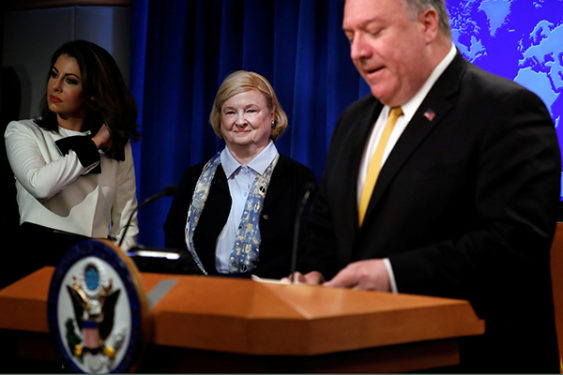
By Christopher White, The Tablet’s National Correspondent
NEW YORK — One former U.S. ambassador to the Vatican has been tapped to lead the State Department’s new Commission on Unalienable Rights. Another has signed a letter calling for it to be dismantled.
Earlier this month, Secretary of State Mike Pompeo appointed Mary Ann Glendon, a Harvard Professor and former U.S. Ambassador to the Vatican under President George W. Bush, to head the newly formed commission to study the application of fundamental human rights to foreign policy.
Now, 125 Catholic activists and leaders, including Miguel Diaz, a former U.S. ambassador to the Vatican under President Barack Obama, have signed a letter opposing the new body. The signatories predominantly come from the progressive wing of the Church.
The letter, dated July 19 and addressed to Pompeo, calls for the Commission of nine members to be dismantled.
“Our faith and our commitment to the principles of democracy require us to view every person on earth as a full human being. We staunchly support the fundamental human rights of all people and proudly carry on the long tradition in our country of advocating for expanding human rights around the world,” they write.
“Our concern is that this Commission will undermine these goals by promoting a vision of humanity that is conditional, limiting, and based on a very narrow religious perspective that is inconsistent with the beliefs and practices of billions in this country and around the world.”
The letter is the result of conversations among four Catholic leaders, Diaz, Dignity USA Executive Director Marianne Duddy-Burke, feminist theologian Mary E. Hunt, and Fordham University ethicist Father Bryan Massingale. The four recently participated together in DignityUSA’s 50th anniversary commemoration focusing on LGBT concerns.
Diaz served as U.S. ambassador to the Vatican under President Barrack Obama from 2009-2012 and is currently a professor at Loyola University Chicago.
The letter goes on to highlight specific areas they believe the commission could, in their view, violate Catholic concerns.
“Of most urgent concern is that the composition of the Commission indicates that it will lead our State Department to adopt policies that will harm people who are already vulnerable, especially poor women, children, LGBTI people, immigrants, refugees, and those in need of reproductive health services,” they write.
“These policies will be embedded in everything from visa and immigration laws to international aid programs and will further undermine true human rights in the name of a very partial version of Christianity that is being promoted by the current Administration. We cannot allow this to happen in our names and pledge our ongoing efforts to prevent this from being how our nation’s human rights stance is communicated to the rest of the world,” the letter states.
At the launch of the commission, Pompeo stated that the mandate will be to probe certain questions such as “What does it mean to say or claim that something is, in fact, a human right?”; “How do we know or how do we determine whether that claim that this or that is a human right? Is it true, and therefore, ought it to be honored?”; and “How can there be human rights, rights we possess not as privileges we are granted or even earn, but simply by virtue of our humanity belong to us?”
Further specifics on the scope of the commission have not been revealed, although many critics have focused on the language of “natural law” and the early involvement of Princeton Professor Robert George, a prominent Catholic defender of traditional marriage and pro-life advocate.
At the Commission’s launch, a State Department representative told the Washington Post that neither issue would be a part of the Commission’s work.
At time of publication, the State Department has not responded to The Tablet’s request for comment.
